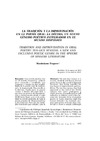Please use this identifier to cite or link to this item:
https://accedacris.ulpgc.es/jspui/handle/10553/58625
| DC Field | Value | Language |
|---|---|---|
| dc.contributor.author | Trapero, Maximiano | en_US |
| dc.date.accessioned | 2019-12-16T18:34:40Z | - |
| dc.date.available | 2019-12-16T18:34:40Z | - |
| dc.date.issued | 2013 | en_US |
| dc.identifier.issn | 0570-4065 | en_US |
| dc.identifier.other | Dialnet | |
| dc.identifier.uri | https://accedacris.ulpgc.es/handle/10553/58625 | - |
| dc.description.abstract | Una estrofa poética hay en el mundo hispánico, todavía poco conocida y estudiada, que comparte e integra las dos modalidades de la poesía oral: la tradicional y la improvisada. Esa estrofa es la décima, fijada para la poesía "culta" a finales del siglo XVI, y que tuvo un proceso de popularización y folclorización desde el siglo XVIII hasta llegar a ser en la actualidad la estrofa preferida de toda la poesía popular de Hispanoamérica (y de Canarias). Pero por las múltiples funciones que cumple y por la variedad de formas con que se muestra, de ser una simple (aunque afortunada) estrofa de la literatura del Barroco se ha convertido en un nuevo género que integra las dos modalidades históricas de la poesía popular. | en_US |
| dc.description.abstract | The ten-line stanza is a scantly studied and lesser-known poetic form in the world of Spanish literature, that brings together the two facets of improvisation and tradition. The ten-line stanza, that first appeared at the end of the XVIth century has since undergone a whole process of popularisation and inclusion in folklore until it has become the favourite form of popular poetry in Latin America (and thw Canary Islands). Its multiple purpose and variety of forms have converted it from a simple (although flexible) form of verse framed within the Baroque tradition into a new genre that unites the two historical models of popular poetry. | en_US |
| dc.language | spa | en_US |
| dc.relation.ispartof | Anuario de Estudios Atlánticos | en_US |
| dc.source | Anuario de Estudios Atlánticos [ISSN 0570-4065] (59), p. 687-718 | en_US |
| dc.subject | 55 Historia | en_US |
| dc.subject.other | Literatura oral | en_US |
| dc.subject.other | Romancero | en_US |
| dc.subject.other | Cancionero | en_US |
| dc.subject.other | Décima | en_US |
| dc.subject.other | Poesía improvisada | en_US |
| dc.subject.other | Oral literature | en_US |
| dc.subject.other | Ballads | en_US |
| dc.subject.other | Collection of verse | en_US |
| dc.subject.other | Ten-line stanza | en_US |
| dc.subject.other | Stanza | en_US |
| dc.subject.other | Improvised poetry | en_US |
| dc.title | La tradición y la improvisación en la poesía oral: la décima, un nuevo género poético integrador en el Mundo Hispánico | en_US |
| dc.title.alternative | Tradition and improvisation in oral poetry: ten-lince stanzas. A new and inclusive poetic genre in the sphere of Spanish literature | en_US |
| dc.type | info:eu-repo/semantics/article | en_US |
| dc.type | Article | en_US |
| dc.identifier.url | http://dialnet.unirioja.es/servlet/articulo?codigo=4710729 | - |
| dc.description.lastpage | 718 | - |
| dc.identifier.issue | 59 | - |
| dc.description.firstpage | 687 | - |
| dc.investigacion | Ciencias Sociales y Jurídicas | en_US |
| dc.type2 | Artículo | en_US |
| dc.contributor.authordialnetid | 504224 | - |
| dc.identifier.dialnet | 4710729ARTREV | - |
| dc.identifier.ulpgc | Sí | es |
| dc.description.dialnetimpact | 0,0 | |
| dc.description.dialnetq | Q2 | |
| item.grantfulltext | open | - |
| item.fulltext | Con texto completo | - |
| crisitem.author.dept | GIR Investigaciones Filológicas en Canarias y Nuevas Tecnologías de la Información y la Comunicación | - |
| crisitem.author.dept | Departamento de Filología Hispánica, Clásica y de Estudios Árabes y Orientales | - |
| crisitem.author.parentorg | Departamento de Filología Hispánica, Clásica y de Estudios Árabes y Orientales | - |
| crisitem.author.fullName | Trapero Trapero, Maximiano | - |
| Appears in Collections: | Artículos | |
Page view(s)
109
checked on Jan 10, 2026
Download(s)
45
checked on Jan 10, 2026
Google ScholarTM
Check
Share
Export metadata
Items in accedaCRIS are protected by copyright, with all rights reserved, unless otherwise indicated.
